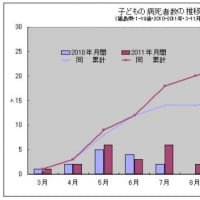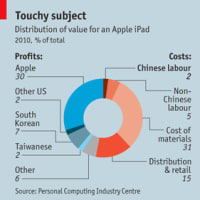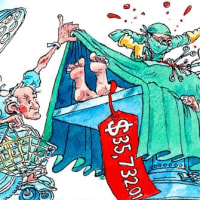前に、いくつかネットブック関連記事をご紹介して、マイクロソフトの生き残り戦略みたいなことを書かせていただきましたが、ロンドンエコノミスト誌が大体おなじようなことをきれいにまとめているので今日はそれを。
Small but disruptive
前半で、ネットブックのこれまでの流れが書いてあって、そうですな、安いパソコンがでてきて、ちょうどいい具合に不景気にもなって安いものがはやりだし、インテルが安くて電力消費の小さなATOMというCPUを開発して・・・、
More important, netbooks and similar devices could weaken Microsoft and Intel, which have so far dominated the PC industry and extracted most of the profits. To keep Linux off most netbooks, Microsoft has had to discount Windows XP from $40-45 per copy to $10-15. This, along with the general weakness of the PC market, explains why its earnings dropped almost a third in the first quarter of this year.
で、もっと大事なことは、ネットブックは、マイクロソフトとインテルの力を弱めるかもしれないってことで、
マイクロソフトはリナックスをネットブックから追い出すために、XPマージンを40~45ドルから10~15ドルに下げねばならなかった。
PC市場の弱さとあいまって、このことが第一Qの利益が3分の1ほど減ってしまった。
To make more money from netbooks, it will offer a minimalist “starter” edition of Windows 7, the new version of its operating system due out in October.
ネットブックからもっと稼ぐために10月のWondows7では機能を限定したスタートバージョンを発表するはずだ。
Intel, by contrast, has so far mainly benefited from the netbook craze, which has created a huge market for its Atom chip. The firm insists this has neither cannibalised sales of its other chips as much as feared nor put pressure on its lofty margins, since Atom costs less to make.
一方でインテルは、Atom CPUが売れることで、ネットブックブームから、今のところ利益を得ている。インテルは、恐れられているほどAtomがAtom以外のチップの売り上げを食ってしまうことはないと言っているし、Atomの製造コストは安いのでマージンへの影響もないと主張している。
Still, just as with Linux, there is a credible alternative to Atom: processors based on designs by ARM, a British firm, which already power most of the world’s mobile phones. Several Taiwanese PC-makers are working on a netbook-like gadget that would be powered by an ARM chip and run Android, a variety of Linux developed by Google for use on smart-phones.
とは言え、携帯で使われている英国のARMで開発されたプロセッサもあって・・・、といつまでも安泰でいられるんかいな、ってとこですな。
さて、マイクロソフトですが、
マイクロソフト 損益推移
第一Q、確かにがくんと落ちてますなあ。まあ、PCなんでもともと第一Qが弱いとしてもおかしくない感じもしますが、前年比でもどんとおちてるようで。
世界的にほかの優良どころも悪いので、マイクロソフトの成長が止まってちょいとばかし悪くなっても、当たり前と見るか、あるいはやばくなる遠い前兆とみるか。
ただ、今のところは、ネットブック市場を押さえているわけで、しかもネットブック1台あたり15ドルもとってれば、エンドユーザーがPC支出にしめるマイクロソフトの取り分も変わりませんな。
依然、PCマーケット全体が伸びればマイクロソフトは同じく伸びる、という構造なわけで。ネットブックだろうが、高額パソコンだろうが全体の金額べースで伸びれば大丈夫。
結局、OSで取って代わるところが出てくるかどうか、なんですな。15ドルより安くてってことになると、やはりアンドロイドのような無料OSとの戦いになるでしょうが、Windows資産をそのまま引き継げる魅力を15$で手放しますかな。
Small but disruptive
前半で、ネットブックのこれまでの流れが書いてあって、そうですな、安いパソコンがでてきて、ちょうどいい具合に不景気にもなって安いものがはやりだし、インテルが安くて電力消費の小さなATOMというCPUを開発して・・・、
More important, netbooks and similar devices could weaken Microsoft and Intel, which have so far dominated the PC industry and extracted most of the profits. To keep Linux off most netbooks, Microsoft has had to discount Windows XP from $40-45 per copy to $10-15. This, along with the general weakness of the PC market, explains why its earnings dropped almost a third in the first quarter of this year.
で、もっと大事なことは、ネットブックは、マイクロソフトとインテルの力を弱めるかもしれないってことで、
マイクロソフトはリナックスをネットブックから追い出すために、XPマージンを40~45ドルから10~15ドルに下げねばならなかった。
PC市場の弱さとあいまって、このことが第一Qの利益が3分の1ほど減ってしまった。
To make more money from netbooks, it will offer a minimalist “starter” edition of Windows 7, the new version of its operating system due out in October.
ネットブックからもっと稼ぐために10月のWondows7では機能を限定したスタートバージョンを発表するはずだ。
Intel, by contrast, has so far mainly benefited from the netbook craze, which has created a huge market for its Atom chip. The firm insists this has neither cannibalised sales of its other chips as much as feared nor put pressure on its lofty margins, since Atom costs less to make.
一方でインテルは、Atom CPUが売れることで、ネットブックブームから、今のところ利益を得ている。インテルは、恐れられているほどAtomがAtom以外のチップの売り上げを食ってしまうことはないと言っているし、Atomの製造コストは安いのでマージンへの影響もないと主張している。
Still, just as with Linux, there is a credible alternative to Atom: processors based on designs by ARM, a British firm, which already power most of the world’s mobile phones. Several Taiwanese PC-makers are working on a netbook-like gadget that would be powered by an ARM chip and run Android, a variety of Linux developed by Google for use on smart-phones.
とは言え、携帯で使われている英国のARMで開発されたプロセッサもあって・・・、といつまでも安泰でいられるんかいな、ってとこですな。
さて、マイクロソフトですが、
マイクロソフト 損益推移
第一Q、確かにがくんと落ちてますなあ。まあ、PCなんでもともと第一Qが弱いとしてもおかしくない感じもしますが、前年比でもどんとおちてるようで。
世界的にほかの優良どころも悪いので、マイクロソフトの成長が止まってちょいとばかし悪くなっても、当たり前と見るか、あるいはやばくなる遠い前兆とみるか。
ただ、今のところは、ネットブック市場を押さえているわけで、しかもネットブック1台あたり15ドルもとってれば、エンドユーザーがPC支出にしめるマイクロソフトの取り分も変わりませんな。
依然、PCマーケット全体が伸びればマイクロソフトは同じく伸びる、という構造なわけで。ネットブックだろうが、高額パソコンだろうが全体の金額べースで伸びれば大丈夫。
結局、OSで取って代わるところが出てくるかどうか、なんですな。15ドルより安くてってことになると、やはりアンドロイドのような無料OSとの戦いになるでしょうが、Windows資産をそのまま引き継げる魅力を15$で手放しますかな。




















※コメント投稿者のブログIDはブログ作成者のみに通知されます